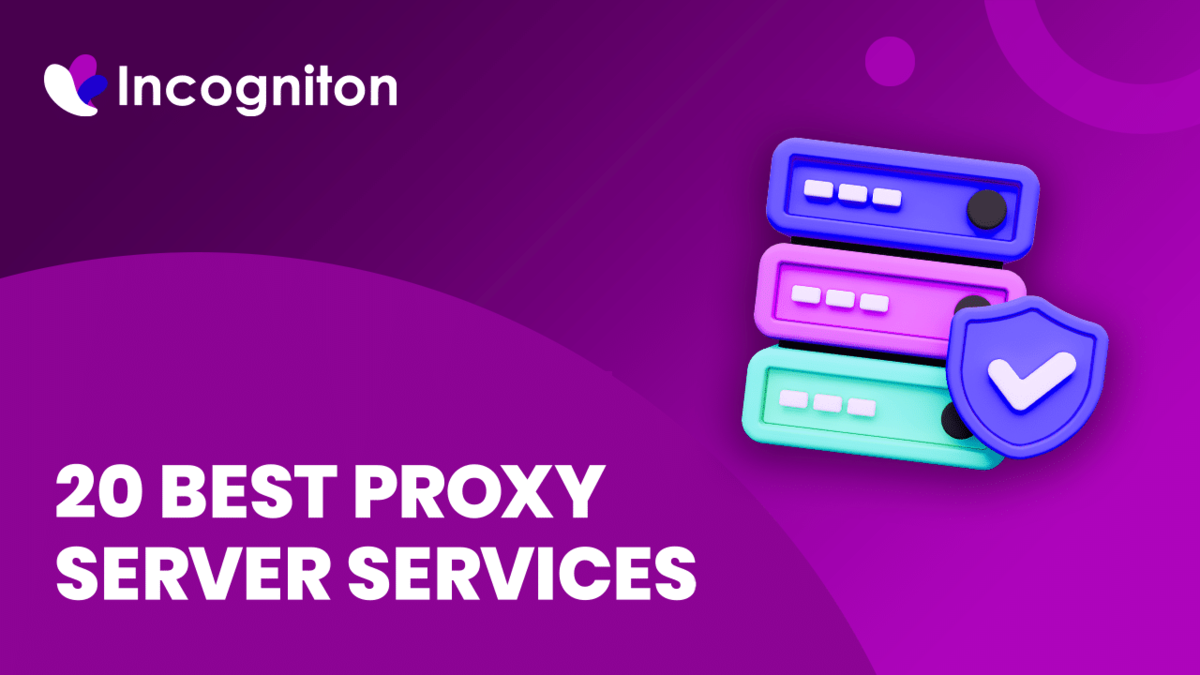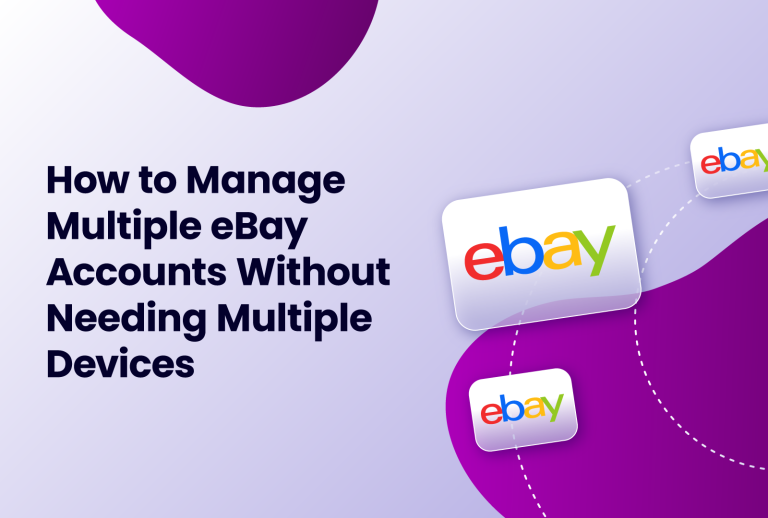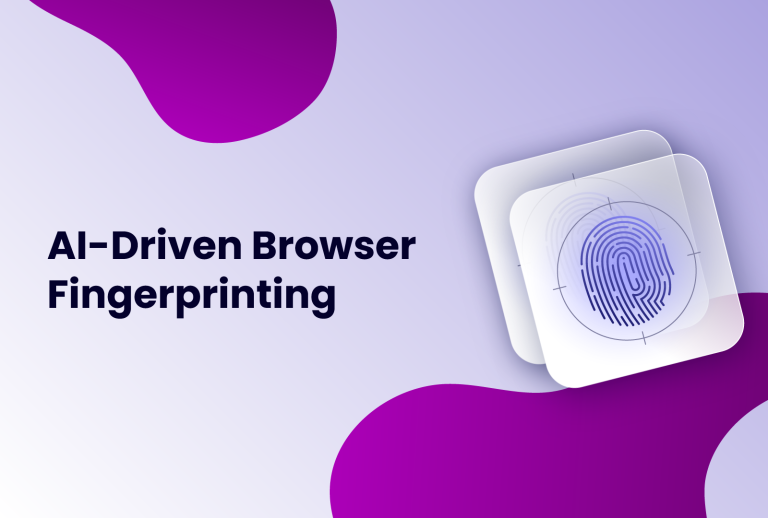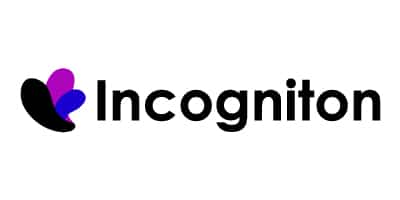A proxy server acts as a gateway between your private network and the internet and helps protect your data and browsing information. However, without proper knowledge of how proxy servers work, it is easier to fall face flat in pursuing data privacy using proxies.
This article explores the following topics:
- We explain what proxies are and how each type differs from the others in practical terms.
- We cover the main proxy types you’re likely to encounter.
- We include a list of vetted proxy providers you can choose from when you need them.
Our goal is to get you familiar with proxies that work and better understand what you need. Let’s get started with the basics.
What is a proxy server?
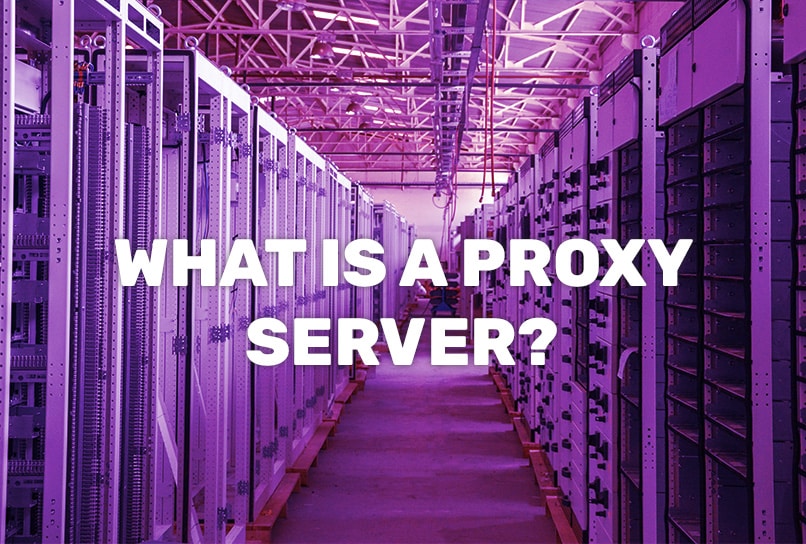
A proxy server is another computer that serves as an intermediary between you and the internet. This means the data exchange between you and the internet servers passes through proxy servers.
Proxy servers have their IP addresses just as you have yours. So when you use them, your data requests go through the proxy server that sends it with its IP address to the internet servers. When the internet server returns data to you, it is also via the proxy server. This way, your IP address is unknown to the internet servers.
A proxy server works similarly to a post office. The big difference is that your address is only known to the proxy system and not the receiver. Thus, the receiver returns a reply to the postal service and not you directly.
A standard proxy server configuration works as follows:
- A user enters a website’s URL into their browser.
- The proxy server receives the user’s request.
- The proxy server forwards the request to the web server.
- The web server sends a response back to the proxy server.
- The proxy server forwards the response to the user.
Proxies are gateways in internet real estate. However, they come with a twist. These gateways have identity-concealing features. When you go through them, you are recognized as a different entity from what you were before. This can help improve your privacy as site owners are unable to track your web activities via your IP address.
Asides from enforcing anonymity and privacy, proxy servers are used for a lot of other things. For instance, hosting firewalls and regulating internet traffic. They are also used to either bypass content filters or set up content filters.
Some use proxy servers in place of WiFi routers to share internet connections. Internet users who desire anonymity and data privacy on the internet also use them to achieve these goals.
Why do we need proxy servers?

We use proxies for a lot of reasons. Some of these reasons include the following.
To Maintain Our Privacy
A proxy server can assist users in browsing the internet more privately. Some servers conceal the IP address and personal information of other users, so your information is not included in the web request.
The proxy accomplishes this by masking your IP address from requests and communicating with other web servers via its IP address. This method keeps destination servers from seeing your information and can help you keep your internet browsing habits private.
To Enhance Web Security
A proxy server can also improve web user security by utilizing encryption algorithms. To prevent attackers from reading your web transactions, you can configure servers to encrypt web requests. Proxies can also prevent malware sites from gaining access to your private network through the server.
To Access Blocked Content
Servers can also provide users with access to internet content that businesses or governments may monitor, restrict, or block. For example, you may want to access information from a local charity, but that information may be unavailable via local web servers. A proxy server can make your requests appear to come from a different location, allowing you to access a blocked website.
To Regulate Internet Usage
Setting up a proxy server allows you to control how people use the internet. The server can track web usage and time spent on specific websites. This data can help you understand how long people spend on various websites. To keep users safe while browsing the internet, you can configure these servers to block the use of specific websites.
To Improve Internet Speeds
By saving a local copy of popular websites, a proxy server can help improve internet response performance. This practice, known as caching, reduces the time it takes computers to respond to a request by storing data that the system previously computed.
If you’re browsing the internet and visiting a website from another country, a proxy server in your home country can cache your requests to help you browse faster. Proxies can also help you save bandwidth because the cache limits the number of requests a client sends to the internet and collects all of the server’s web page responses.
Proxy types

As a result, various types of proxy servers are available. Choosing the best one for the job can be difficult. It doesn’t help that your choices will have a real impact on what you can and cannot do with the proxies.
In the rest of the article, we have classified proxy servers using four criteria:
- By the Internet Communication Protocol (ICP) they use
- By accessible, they are (Access Restriction)
- By how they work with IP addresses (Rotation)
- By source of their IP addresses
- By cost of service
Types of Proxy Servers by Protocol
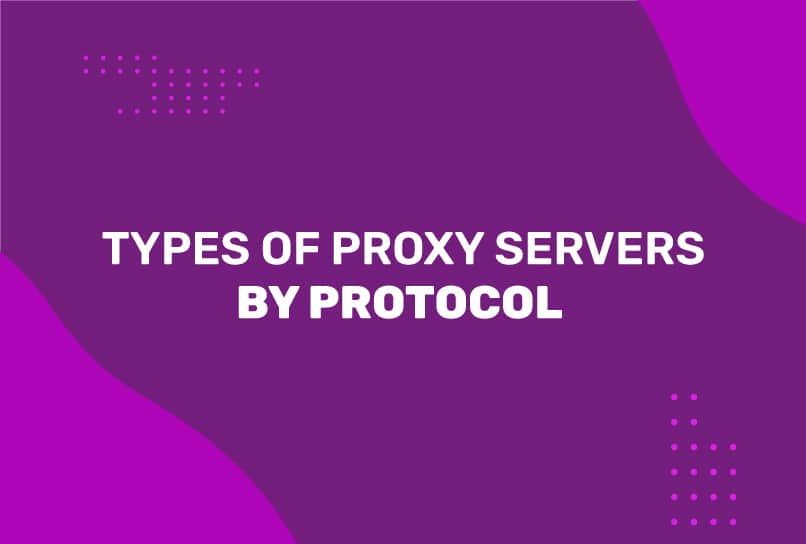
HTTP/HTTPS Proxy Servers
HTTP Proxies are the most popular proxy type. These proxies use the HTTP protocol, which is compatible with most websites on the internet.
HTTP has been largely phased out in regular use because it sends all traffic in plain text. However, it still has many proxy use cases. You should avoid HTTP proxies if you work with sensitive information. Instead, use the replacement HTTPS proxies.
HTTPS Proxies, also known as SSL proxies, are the most secure type of proxies. They use the SSL protocol to encrypt data, which makes it way harder for anyone to get access to the information transmitted. Otherwise, they’re technically the same as HTTP proxies.
One drawback of HTTP/HTTPS proxies is that they work exclusively with web content and cannot be used for other data types. They are not compatible with other data transmission protocols like UDP.
You should be careful when using HTTP proxies. Many HTTP proxies are free and monetize their services by injecting ads into the unsecured connection.
SOCKS Proxy Server
SOCKS (SOCKets Secure) Protocol routes users’ traffic through a third-party server – SOCKS proxy server – via TCP (Transmission Control Protocol).
They work on a lower level than HTTP(S) proxies. In other words, they simply send your data without reading it. This allows them to work with all kinds of traffic, not only websites. For example, you can use them for streaming, gaming, or torrenting. SOCKS5 proxies also support the UDP protocol, which allows transmitting traffic-intensive data much faster compared to TCP.
However, SOCKS proxies do not offer encryption. They can only operate through secured connections if the website/app they are working with uses encryption. SOCKS5 proxy servers support SSH encryption, which enables secure connections with apps that also support it.
FTP Proxy Server
An FTP (File Transfer Protocol) proxy works as an intermediary between all traffic through the FTP protocol. FTP is a protocol for exchanging files over the Internet and internal networks.
FTP proxies are used to control FTP connections based on different parameters, like source IP, destination IP, and user authentication. It is also used to regulate the quantity and frequency of file transfers and authenticate users/receivers before file transfer begins.
CGI Proxy Server
A Common Gateway Interface (CGI) proxy is a web-based proxy server that allows users to access websites anonymously via a web form (or website).
The CGI proxy is used via a web browser and looks like a normal website. All you need to do is to input the destination URL in the provided space, and the CGI proxy shows the results as if it were the originator of the request. The CGI proxy operates through an encrypted web form embedded on another webpage that uses SSL. CGI proxies are used for anonymous web browsing and unblocking geo-restricted websites.
Using CGI proxies, you can access the proxy’s services on devices or networks that do not support proxy configurations.
DNS Proxy Server
Domain Name System (DNS) is the web protocol that allows users to enter a domain name (e.g., incogniton.com) into their browser rather than its IP address. A proxy based on this protocol takes data requests from the user in the form of DNS queries and forwards them to the domain servers, which will complete the user’s request.
The DNS proxy server plays the roles of a DNS server and a DNS query forwarder. It resolves the domain name to an IP address, caches, and forwards queries to and for other DNS servers. It can also redirect the flow of requests across the servers.
Generally, DNS proxy is for improving domain lookup speed and performance and for protecting servers from domain hijacking and DNS spoofing.
Smart DNS Proxy Server
A Smart DNS proxy is similar to a DNS proxy server because it only diverts one part of the user’s internet traffic—DNS requests. However, it serves a different purpose. You can use it to bypass DNS restrictions such as geo-location restrictions.
DNS servers usually connect users to the closest web server in their geo-location. Online content providers, like video streaming services and news platforms, restrict their content based on location.
Smart DNS proxies work around these restrictions by directing DNS requests to specific servers that allow access to such content, a server physically located where the content is available. For example, if a US user wants to access European content, the Smart DNS proxy will divert the DNS request to a Europe-based server.
Smart DNS proxies are often used as alternatives to VPNs to access geo-restricted content, such as Netflix, Amazon Prime, Disney+, Hulu, HBO, etc.
DHCP Proxy Agent
This type of proxy acts as the intermediary for all Dynamic Host Configuration Protocol (DHCP) requests and responses. DHCP servers send network configuration to devices within a network. In situations where devices connected to a subnetwork via a router cannot send configuration requests to the DHCP server, a DHCP proxy agent is needed.
The proxy server forwards such devices’ requests to the original server, receives the response, and relays this back to the device.
Another reason you use a DHCP proxy agent is to protect the real DHCP server and network from attacks and even to optimize the DHCP performance in large networks.
SMTP Proxy Server
Simple Mail Transfer Protocol is a TCP/IP protocol used to send email messages between email servers and also between email clients and email servers over a connection. An SMTP proxy works as a filter. It is configured to allow or deny incoming and outgoing emails based on factors such as source address, the sender’s server, and even the content of the email.
As a result, the proxy filters spam and inappropriate content and protects users from cyber attacks such as phishing attacks and malware.
SIP Proxy
A Session Initiation Protocol (SIP) proxy works as an intermediary between devices operating via the SIP protocol. The protocol is used for initiating, maintaining, modifying, and terminating real-time communications sessions between Internet Protocol (IP) devices.
A SIP proxy improves the communication between two SIP endpoints. It controls calls within a network by requesting information from the SIP registry and directing calls accordingly.
TOR Onion Proxy
TOR Onion Proxy operates on the Onion Routing protocol (hence the name, The Onion Router). It routes the user’s internet traffic via various networks present worldwide and makes it difficult to track the user’s identity. The user’s data is encrypted in multi-layer folds. At the destination, each layer is decrypted to prevent the information from scrambling or getting distorted.
Proxy Types by Access Restriction
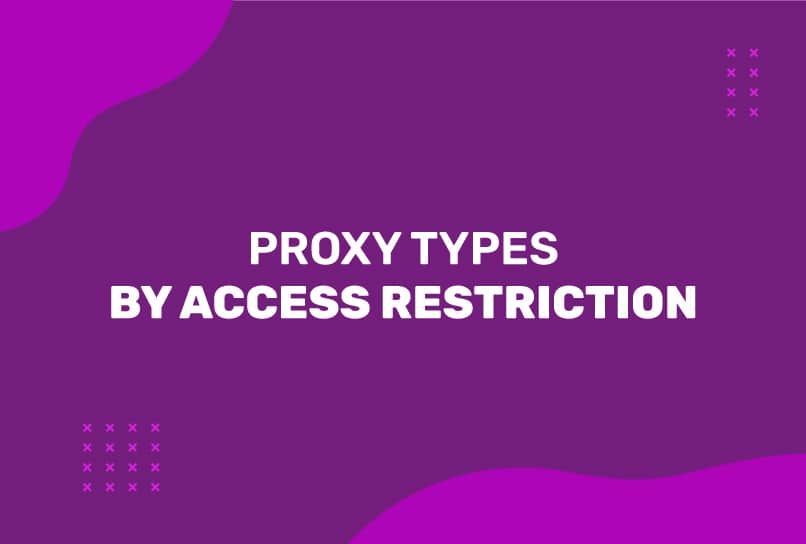
Public Proxies
Public proxies are found online as proxy lists, and anyone with a functional internet connection can use them. They are usually free, but the providers are often unknown. Thus, security is always an issue.
Several people can connect via the same proxy simultaneously, causing the proxy to become unstable or even blocked by websites. Also, this traffic overload affects the connection speeds.
Private Proxies
Private proxies, also known as dedicated proxies, are reserved for one user at a time or a particular domain. There is no lag, delay, or traffic overload. They perform the best out of all three types but also cost the most — they can be five times the price of a shared proxy server.
Shared Proxies
Shared Proxies are also referred to as Semi-Dedicated Proxies as they are a compromise of both public and private proxy features: access to the proxy server is shared by a group of people who pay for the service.
Shared Proxies are relatively inexpensive and stable. They are also more reliable and secure since the user and the company must agree to terms of service. And as a user, you get customer support when something goes wrong.
A shared proxy can have speed issues if more of its users are performing traffic-intensive tasks. The bad-neighbor effect is also present because you can’t fully control the use of the participants in the sharing agreement.
Proxy Types by Session or Proxy Duration
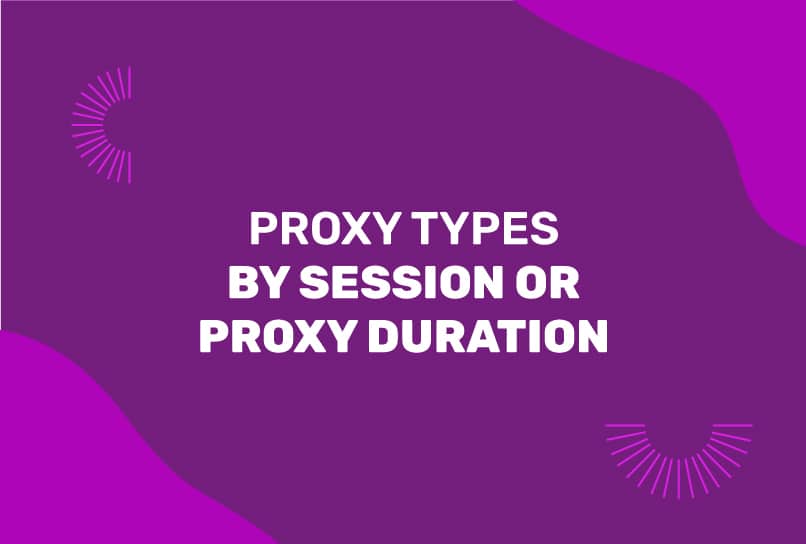
Static Proxies
Static Proxies have IP addresses that you can use for an indefinite period. They work well when you want to keep the same identity: for example, if you manage social media accounts. However, tasks like web scraping are not good choices as websites can effortlessly identify and block them.
Rotating Proxies
In contrast to static proxies, rotating Proxies change IP addresses at set intervals. It can be at every connection request or after some time, usually 10-30 minutes. Since the connecting IP address changes, the user’s identity is usually untraceable.
They are perfect choices for web scraping tasks. No two connection requests would come from the same IP address. And even if an IP gets blocked, the next one will be provided automatically.
Proxy Types by Source of IP Addresses
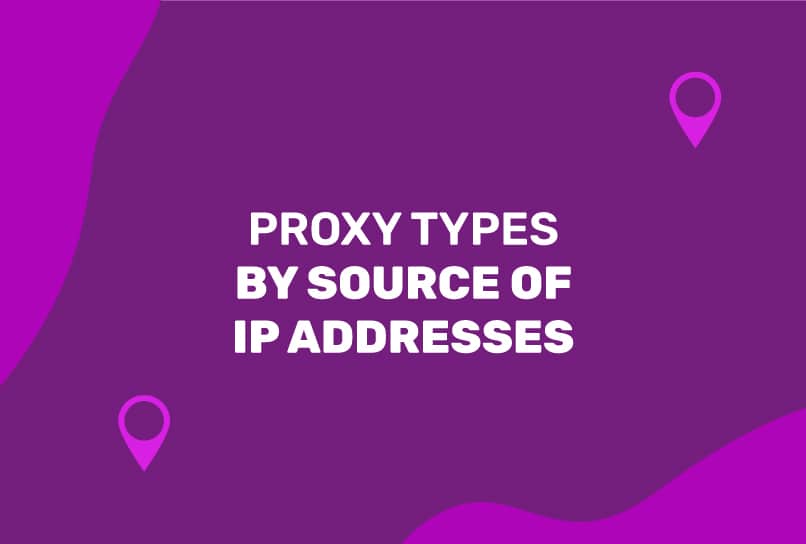
Datacenter IP Proxies
Datacenter proxies are dedicated cloud servers owned by private companies and used for internet connections across the globe. These proxies are used for web hosting services. However, they still function as proxies for internet browsing purposes. Datacenter proxies are popular among internet users because they are suitable for a wide range of tasks which includes unblocking content & data in different locations.
Datacenter proxies use data center IP addresses. Because the data center proxies are not affiliated with ISPs, they offer high levels of anonymity. The IP addresses will trace back to the company and not an individual.
Residential IP Proxies
Residential proxies borrow IP addresses from real users’ devices and enable the proxy user to access the internet with them. These proxies use IP addresses provided directly by ISPs (Internet Service Providers) and are therefore linked to actual homes and devices in various cities and countries.
Using our internet real estate analogy, a residential IP address is a gateway to a single house, a private entity’s building. Webmasters and site owners are aware of it as well.
As a result, when this gateway acts as a proxy, the original IP address of the proxy user is hidden, and the residential IP address is tracked instead. This means that the proxy user is identified as the person residing at that address.
This makes the proxy almost indistinguishable from a regular user, making it much harder for websites to identify a proxy user and block them.
Mobile IP Proxies
A mobile proxy server is a type of proxy that’s usually set up on a 3G or 4G phone network. Mobile proxies are typically smartphones or tablets or any portable device with a 3G or 4G SIM card and mobile data plan.
They operate in the same way as residential proxies. The difference is simply that the internet connection comes from a cellular network instead of a direct ISP-client network connection.
Proxies Types by Service Cost
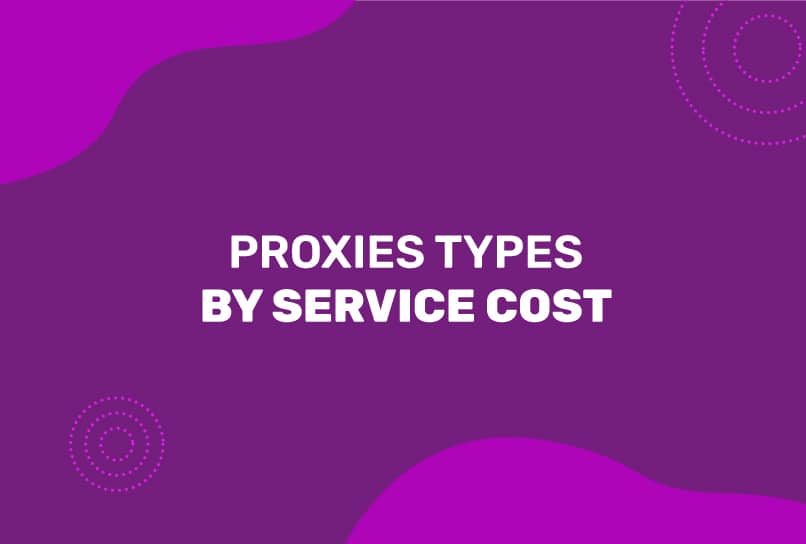
Free Proxies
As the name indicates, you can use these proxy servers without paying anything. You can find Free proxies on various websites on the internet.
However, they are often poor choices. They are slow, overused, and even a privacy nightmare. Malicious agents can easily hack the connection, inject malicious ads, install malware, or even log your data.
If you have to use them, be careful and never trust them with your personal information.
Paid Proxies
The proxy servers you buy from proxy providers are called paid proxies. You will get a better user experience: faster speed, better uptime, and fewer blocks. A trustworthy paid proxy provider will never steal your data, and it will commit to keeping the service running smoothly. If you’re not sure about using proxies or a particular provider, most of them offer a free trial or money-back guarantee.
Proxy Providers
To get the best proxy services, you need to work with a trusted and reliable proxy provider. Proxy providers are a huge factor in assessing the credibility of a proxy service. We created a list of 20 providers of quality proxies for you. We also added promo codes to help you get the best deals as incogniton.com users when you are ready to purchase one.
Oxylabs

Website: oxylabs.io
Proxy type(s): Residential, Datacenter, Mobile
Pricing: from $15 per GB
Promo code: ‘incogniton‘ (15% discount on the first 3 months)
Outstanding Features:
- A next-gen residential proxy that employs machine learning and AI.
- Global coverage (state & city), Proxies in every corner around the world, and city-level targeting.
- Flexible and adjustable session control feature to meet your needs.
Oxylabs is a premium residential proxy provider with the largest pool of IPs, about 100 million, covering cities and countries worldwide. The provider allows you to target proxies based on the ASN (autonomous system number).
Oxylabs also offers mobile, rotating ISP, dedicated Datacenter proxies, and Scraper APIs to cover different needs and use cases. Their shared data center proxies provide access to the 20,000 proxy pool and feature automatic proxy rotation. The IPs come from 6 locations – USA, France, Netherlands, Germany, UK, and Romania. These proxies are available to multiple users simultaneously, reducing costs significantly without sacrificing quality.
Another offering in the Oxylabs portfolio is the next-gen residential proxy that employs machine learning and AI to mimic a regular user’s browsing behavior more successfully and work around blocks and captchas. You also get a dedicated account manager to help you with whatever query you have.
One big drawback is that the Oxylab proxy service is expensive. It might not be ideal for a casual internet user. They offer a 7-day free trial if you’re interested.
Proxy-Seller
Website: proxy-seller.com
Proxy type(s): Residential, SOCKS5, HTTPS, Mobile, Datacenter
Pricing: from $0,70 per proxy port
Promo code: INCOGNITON for 15% discount
Outstanding Features:
Mobile panel for your own proxy farms
Residential, SOCKS5, HTTPS, mobile, and datacenter proxies
Auto-renewal feature for proxies
The company has been in the market for 11 years and has earned positive reviews on Trustpilot, with a current rating of 4.7 stars.
They provide IPv4, IPv6, ISP, Residential, and Mobile proxies that support both HTTP(S) and SOCKS5 connection protocols. Additionally, they offer a mobile panel to create your own rotating mobile proxies, and provide easy-to-setup equipment with worldwide shipping. After setting up your own mobile proxies, Proxy-Seller can help you rent out your proxies if the location is in need, allowing you to receive a percentage of the sales.
Their loyal support team is available to address any issues individually at any time of the day or night. Many customers appreciate this level of support, as well as their very affordable prices, starting from $0.70 per IP.
Proxy-Seller provides proxies for a variety of tasks, including complex tasks such as web scraping and arbitrage with residential proxies.
Smartproxy

Proxy type(s): HTTP/HTTPS/SOCKS5 || Datacenter, Residential, Web Unblocker, Mobile, ISP
Pricing: from $ 1.5 per GB
Promo code: RESI50 – 50% discount for residential proxies.
Outstanding Features:
- One of the fastest residential proxies’ speeds and success rates
- Full self-service free trial options for all products
- Quick time to value – easy to onboard and start using the services
Smartproxy’s residential proxies are known for their balance of reliability, scalability, and ease of use. With a network of over 55 million residential IPs across the globe, they offer solid performance for tasks like web scraping, ad verification, and automation. One of their key strengths is a user-friendly setup, making them accessible to both beginners and experienced users. Compared to some competitors, Smartproxy provides a good mix of affordability and functionality, with flexible pricing and strong customer support. While no proxy provider is perfect, Smartproxy consistently ranks as a strong option for those who need efficient and ethical proxy solutions without excessive costs.
Bright Data

Website: brightdata.com
Proxy type(s): Residential, Static & Rotating
Pricing: from $15 per GB
Promo code: none
Outstanding Features:
- Lifetime IPs, Use your IPs for as long as you require
- Real-time network performance dashboard
- Dedicated Account Managers
Bright Data is one of the largest premium proxy providers today. It has a huge collection of 72 million IPs available to deploy for proxy users.
They offer four different services: Residential, Data Center, ISP Proxy, and Mobile proxy networks. With all these proxy servers, you can target any country, city, and carrier. They have the largest geographical coverage and the best response time in the industry.
For a beginner, Bright Data’s services may be too powerful and intimidating for you, as they demand technical knowledge. Also, its services are bit expensive although they have a PAYG option and a 7-day free trial.
NetNut

Website: netnut.io
Proxy type(s): Static Residential, Rotating Residential, and datacenter
Pricing: from $20 for 1 GB
Promo code: Incog20 (20% discount for Incognition users)
Outstanding Features:
Keep sessions as long as you need
Direct ISP connectivity for faster speed and stability
NetNut is best known for its static residential proxies, which are leased directly from internet service providers. It has a proxy pool that consists of 10 million IPs. It can be used for a variety of different web tasks like search intelligence, price comparison, general web scraping, and sneaker copping.
It is easy to set up and get started. Netnut has a self-service platform that allows users to easily log in and test their network without having to spend hundreds of dollars.
It also has a browser extension for Google Chrome.
IPRoyal

Website: iproyal.com
Proxy type(s): Residential, Datacenter, Static Residential
Pricing: From $4 per GB
Promo code: none
Outstanding Features:
- Precise targeting options (continent, country, state, and city-level where available)
- Traffic-based model (you only pay for the traffic you use, and it never expires)
- API support and free tools (proxy tester, Chrome, and Firefox extensions)
IPRoyal has a collection of up to 400,000 residential IPs in over 190 countries including the US, UK, China, and Germany. They provide a range of dedicated proxy types, including sneaker proxies for shoe enthusiasts who are unable to make mass purchases on the sales site.
Their starting price ($4 per GB) can go down even further to just $0.8 per GB, depending on the amount of traffic you buy. All their proxies are exclusive to the user. You also get HTTP(S) and SOCKS5 support, advanced session control (sticky and rotating IPs), and a support team available 24/7.
IPBurger

Website: ipburger.com
Proxy types: Residential,
Pricing: from $69 per month
Promo code: none
Outstanding Features:
- ISP, Country, State, or City-level Targeting
- Offer personalized plans
IPBurger has a pool of 60+ Million Residential Proxies in 930 cities around the world. You get granular control of the location of the proxy service. They provide a proxy rotation manager with a clean and easy-to-use interface.
IPBurger also uses top-of-the-line security measures to keep users safe. They operate with military-grade encryption and a strict no-logs policy. Their service is compatible with all major platforms and devices.
Their pricing plan is quite competitive. They offer a free 7-day trial and after your first purchase, the rates drop significantly the more data you buy.
The proxy service is great for completing tasks in eCommerce, Social Media, Market Research, Content Creation, and Web scraping.
DoveIP
Website: doveip.com
Proxy type(s): HTTPS, residential, mobile
Pricing: from $4 per GB
Promo code: none
Outstanding Features:
- A large pool of mobile proxies to choose from
- Mobile-friendly (Android)
- Chrome browser extension support
DoveIP provides instant access to more than 20 million proxies in 195 locations around the world. The proxy service is suitable for web tasks like Social Media, Digital Marketing, and Web Scraping.
They excel in mobile proxy network service. With their IP filter, you are guaranteed clean and authentic 3G/4G mobile proxies that suit your tasks. They also offer API support and chrome extensions.
The proxy service is relatively new. They have fewer features compared to the other providers, yet they provide quality service.
SOAX

Website: soax.com
Proxy type(s): Residential, Mobile
Pricing: from $99 per month
Promo code: INCOGNITION20 (for 20% discount on the first month)
Outstanding Features:
- Precise targeting options
- Very flexible rotation
SOAX has a pool of 8.5M+ ethically sourced proxies. Proxies from this provider are perfect choices for tasks like data collection and social media management. The provider allows you to rotate the IP organically. You also get to control your node access if you are using a static proxy.
SOAX proxies are intuitive to use. In addition to that, they provide comprehensive documentation on their website. You can always find your way via their help articles.
Astro

Website: astroproxy.com
Proxy type(s): Residential, Mobile, Datacenter
Pricing: from $0.37 per 100 MB (discounts up to 25% and corporate benefits also available)
Promo code: INCOGNITON10 for 10% discount (can be used once when ordering a proxy)
Outstanding Features:
- Free trial: $3 to your account, no limits on time, type, geo and number of proxies.
- Astro’s proxies support seamless integration with OpenVPN via a configuration file (iOS, Windows, Mikrotik, Android, and macOS).
- Enterprise-grade multichannel support via Facebook, Telegram, live chat, WhatsApp, and email.
Astro is an enterprise proxy infrastructure for web data collection. The Astro pool features 50 million IPs from real users, sourced in full compliance with KYC and AML policies. This approach ensures stable performance and significantly reduces the risk of account blocks.
Choose your datacenter, residential and mobile proxies from 100+ countries. Get VPN-compatible dynamic proxies with HTTPS and SOCKS5 support, from $0.37 per 100 MB. A single-page interface provides granular control, detailed logs, and real-time statistics.
Astro is full-spectrum solution for web data gathering, SEO, SMM, e-commerce, software testing, AI-driven models teaching, marketing, and advertising purposes.
Storm Proxies

Website: stormproxies.com
Proxy type(s): rotating, residential, HTTP & HTTPS
Pricing: from $39 per month
Promo code: none
Outstanding Features:
- No bandwidth cap
- Non-sequential IP range
Storm Proxies is a small, budget provider with a pool of 200,000 rotating proxies with multiple locations to choose from. It is best for individual and small-time proxy users that don’t require many advanced features but want quality service. There is no location choice granularity. You can only choose between broad regions of the US, EU, and worldwide.
Storm Proxies’ biggest feature is that all of its proxies come with limitless bandwidth. Furthermore, proxy IPs are rotated at random (and with each HTTP request), making them ideal for SEO and link building.
Ping Proxies

Proxy type(s): Static Residential, Datacenter
Pricing: from $25 per GB
Promo code: INCOGNITION for 25% OFF
Outstanding Features: Diverse Product offerings
Ping Proxies’ product portfolio is diverse, with options for novices up to power users with over 115 million IP addresses in their network. In the United States and Europe, they provide unlimited bandwidth Static Residential ISP proxies.
Because their IP addresses do not change, their Static Residential ISP proxies are ideal for long-term account management. They use a variety of premium ISP carriers/ASNs for their services, including Spectrum, ATT, Windstream, Telia, and BT.
Ping Proxies is beginner friendly and offers small packages in both their Static Residential ISP and peer-to-peer Residential product offerings. They deliver their packages in the IP:PORT:USERNAME: PASSWORD format and use the HTTPS protocol to enhance security.
HydraProxy

Website: hydraproxy.com
Proxy type(s): mobile, static, residential
Pricing: from $2.35 per GB
Promo code: none
Outstanding Features:
- No minimum payment and flexible pricing system
- Full control over the protocol, network type, and location of your proxies
HydraProxy’s robust offering includes over 5 million IPs from all over the United States. They can filter IP addresses, pick IP addresses from specific locations, and modify IP addresses. All you need to do to configure the proxy is to copy the server IP address, port number, username, and password and input the details in the application that will use it.
HydraProxy has a customizable price structure. They allow you to purchase proxies in any of their plans for as little as one, two, or seven days. This is a unique offer, as other proxy providers do not provide this level of flexibility.
ASocks

Website: asocks.com
Proxy type(s): Residential
Pricing: from $3 per 1 GB
Promo code: none
Outstanding Features: Accepts cryptocurrency as payment options
ASocks has extensive global distribution. You can select and connect to proxies from over 150 countries, including the United States, France, Germany, the United Kingdom, and the Netherlands, among others. They use proxy addresses (endpoints) instead of IP addresses to make it easier to use because the IP addresses do not need to be changed — they rotate automatically. Every user has access to over 20,000 IP addresses (mobile) and 30,000 – 90,000 IP addresses (Wi-Fi) regardless of plan.
ASocks proxies are suitable for both new users and professionals. Their easy-to-use and intuitive interface comes with precise fine-tuning tools for users who need it. They also have an open API available to enthusiastic users who want to customize their experience.
Instant Proxies

Proxy type(s): HTTP, HTTPS
Pricing: from $1 per proxy port
Promo code: none
Outstanding Features:
- Simple and intuitive dashboard
- Unlimited bandwidth
Instant Proxies was founded in 2013. It operates servers in the United States, Europe, and Africa. And, as the name implies, their proxies are sent instantly after you make a purchase. They also allow users to test proxies for $1 per proxy with a 100% money-back guarantee if the proxies do not operate for their intended purpose.
All proxies are unique and may be customized to meet the needs of the user. Users can contact their customer care staff at any time via chat or support ticket to request their desired location and purpose.
Proxy-Sale

Website: proxy-sale.com
Proxy type(s): Datacenter, SOCKS5, HTTPS
Pricing: from $1 per proxy port
Promo code: none
Outstanding Features:
- unlimited bandwidth
- authorization methods: username and password, or by your main static IP
Proxy-Sale proxies are offered in 30 countries, including the United States, the United Kingdom, and Germany. With the assistance of the support staff, you may pick a certain city/state in a needed location. Proxies are also classified according to their intended usage. So, when you place an order, you specify your intended usage, and Proxy-Sale assures that the IPs it supplies will function properly.
Proxy-sale provides one-of-a-kind use case proxies that are tailored for certain needs. Proxy servers are available for gaming, streaming, sneaker copping, and managing social media. For these duties, the proxies have the perfect speed and browsing settings.
Rayobyte

Website: rayobyte.com
Proxy type(s): Datacenter, residential, ISP, Mobile
Pricing: from $1 per GB
Promo code: none
Outstanding Features: Unmetered bandwidth and concurrent connections
Rayobyte was known as BlazingSEO until July 2022. The Company has its roots in SEO marketing and related business. It still retains this specialty as its data center proxies are optimized for SEO businesses. Despite this, their offering consists of all kinds of proxies for everyone. You buy proxies as long as a year and as short as a month.
Rayobyte has proxy servers in 30 locations. It operates and manages its hardware by itself. It offers an arsenal of tools for its users to get the best out of their proxies.
LTEBoost
Website: lteboost.com
Proxy type(s): Mobile, residential
Pricing: from $25 per proxy port
Promo code: INCOGNITON (10% discount for Incogntion users)
Outstanding Features: Manual or automatic IP address rotation
LTEBoost is a primary mobile proxy provider but they also provide residential proxies. Their mobile proxies are spread throughout the world including the USA, Thailand, and Ukraine. You can choose from over 20 different connection fingerprints when you use their mobile proxies. The proxies are a great fit when working with social media, anti-detect browsers, and web scraping tools.
PrivateProxy

Website: privateproxy.me
Proxy type(s): HTTP/HTTPS
Pricing: from $1 per IP
Promo code: none
Outstanding Features: Free Monthly Swap of IPs
PrivateProxy.me has 15,000 IP addresses and servers throughout Europe, North America, and Asia, including the United Kingdom, the United States, Canada, and Germany. Following the purchase, they automatically assign proxies and you may begin utilizing them. You can choose from either IP Authorization or username-password authentication since both are supported. You can authorize up to ten proxies at the same time.
PrivateProxy.me provides a free trial of three proxies for seven days though you must enter your billing information. Their proxies are appropriate for normal surfing, social media marketing, streaming, and site scraping.
Proxy6
Website: proxy6.net
Proxy type(s): HTTPS, SOCKS
Pricing: from $0.06 per proxy port
Promo code: none
Outstanding Features:
- Proxy switching
- Automated proxy management
Proxy6 offers some of the most affordable proxies on the market. However, their modest pricing does not affect the overall quality of their services. They include intriguing capabilities, such as the ability to swap proxy types – from your user dashboard, you can switch between HTTPS and SOCKS proxies. They also sell IPv6 proxies.
They have a flexible pricing policy. You purchased their proxies for three days, a week, or a month. You can also request a refund within 24 hours after making your purchase.
Thordata

Website: Thordata
Proxy type(s): Residential, Static,Mobile,Rotating & High-Bandwidth
Pricing: from $1.8 per GB
Promo code: THOR457(30% off coupon)
Outstanding Features:
- 60M+ Global Residential IP Pool Access over 60 million ethically sourced residential IPs worldwide. Scale your operations seamlessly without the risk of IP bans.
- 99.9% Uptime & Precision Control Guaranteed 99.9% uptime with pinpoint geo-targeting and session control. Includes ready-to-use datasets and 24/7 expert support.
- 120+ Web Scraper APIs Extract structured data instantly from social media, e-commerce, and SERP. No CAPTCHAs, no parsing, no headaches.
- Effortless No-Code Integration Easily integrate with our no-code scrapers. Unlock reliable data access and empower your infrastructure immediately.
Thordata provides access to a global network of over 60M+ residential proxies with 99.9% uptime, along with Mobile, Static ISP, and Datacenter options. Prices start from just $0.65/GB for residential traffic, making it one of the most cost-effective solutions on the market.
Our platform provides businesses with seamless access to a global pool of 60M+ real residential IPs across 190+ countries, allowing teams to discover, extract, and interact with web data with exceptional speed, accuracy, and reliability.
Our 24/7 support and free trial ensure a smooth start, while advanced targeting by country, state, city, or ASN makes it easy to scale projects worldwide. Thordata proxies are well-suited for e-commerce data scraping, SERP monitoring, brand protection, ad verification, and social media data collection.
They offer a 7-day free trial if you’re interested.
What to Look for When Searching for the Ideal Proxy Provider
Each proxy provider has unique characteristics, and these distinctions influence the type of service they provide. It is critical to research and select a service that fulfills your requirements.
Here are some of the key factors to consider while selecting an ideal proxy provider:
1. Pricing Structure: Your budget is key to choosing the ideal proxy provider. However, you must do your research well and find out which providers will give you more bangs for your buck.
2. Quality of Service: If you haven’t used the service, you can’t judge its quality. However, by reading other people’s evaluations and scrutinizing the proxy claims, you may forecast how their service will be. In your research, keep the following points in mind:
- IP Pool Size: Proxy services with small pool sizes will deliver a subpar service. Keep an eye out for claims about the size of their IP pool. You must confirm this before making your decision. Because they have a small IP pool, IP bans will have a significant impact on them. It also implies that you will lack granular control over site selection.
- Features: To differentiate their offerings, each proxy provider includes additional features. You must examine these features and determine which ones are most appropriate for your tasks. This is significant since it relates to the cost of the service. These features are not always free. They will have an impact not only on the quality of the service but also on the expense of enjoying it.
- Customer Service: Make certain that you can always seek help when you need it. Without proxy services, whether in the form of rich documentation or live help channels, excursions are disastrous. When you require assistance, your ideal proxy service should have channels to deliver it.
3. Reputation: Your ideal proxy provider should have a good reputation and be legitimate. Learn about the provider’s operations, how it acquires IP, and what the public thinks about it. If you do not conduct due diligence on these subjects, you face cybersecurity threats as well as infractions of laws and regulations.
Final Words
When looking for the best proxy to use, look for features such as geo-restriction bypassing, browser extensions, unlimited bandwidth, and a large proxy pool.
If speed is important, look at the server speeds and locations; if security is important, look at the service’s encryption level. And lastly, consider whether the pricing models of the proxy fit your budget.
There are many kinds of proxies to choose from. It all depends on what you intend to do with a proxy and what your budget allows.
Now that you are familiar with the different types, you can make wiser and more informed decisions that help you achieve your aims.
